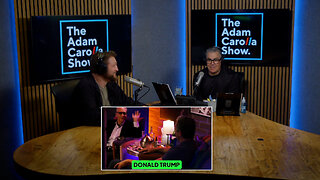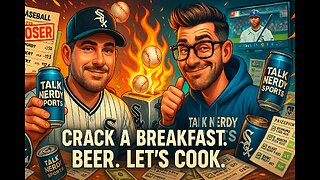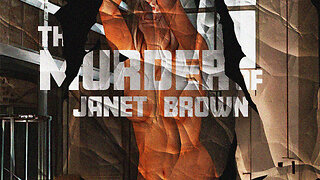Premium Only Content

Is the Quran God's Word? – Lecture (Part 2)
Dr Zakir Naik,The Qur'an speaks about Geology. The Geologist say that the radius of the earth is 3750 miles. The deeper layers are hot and fluid, the upper layer is a thin crust hardly 1 to 20 miles in thickness. And there are high possibilities it will shake. It is due to the 'folding phenomena', which gives rise to mountain ranges, which prevents the earth from shaking.
Allah mentions this in the Qur'an... its mentioned in the Qur'an in Surah Nabaa', Chapter No. 78, Verse No. 7 as well 8, Allah says,
"Wa Al-Jibaala 'Awtaadaa"
"We have made the earth as an expanse",
"And the mountains as pegs.
Which science has agreed today, a similar message is mentioned in Surah Anbiya, Chapter 21, Verse 31, that
"We have placed on the earth, mountains standing firm lest it would shake with you"
In the field of Oceanology, previously we knew that there were two types of water, salt and sweet, but the Qur'an says in Surah Furqan, Chapter 25, Verse No. 53, that,
"It is He who has let free two bodies of flowing water: one sweet and palatable the other salty and bitter; though they meet, they do not mix there's a barrier which is forbidden to be trespassed."
Today We knew that there were two types of water, but what does the Qur'an mean that there's a barrier which is forbidden to be trespassed. Today we know that whenever one type of water flows into the other type of water, it looses its constituents and gets homogenized into the water it flows. This homogenizing area is called as a barrier, a 'Barzakh' in the Qur'an. Qur'an mentions this 1400 years ago.
Qur'an mentions about Biology. It's mentioned in Surah Ambiya, Chapter No. 21, Verse No. 30,
"Wa Ja`alna Minal-Maa'i Kulla Shay'in Hayy 'Afalaa Yu'uminun"
"We have created every living thing from water, will you not then believe'
Who could have believed in the deserts of Arabia that every thing is made of water. Today science tells us that every living thing is made from water.
There is a theory known as "Theory of Probability", that you make a wild guess the chances you will be right is depending upon what are the options. For example, if I toss a coin... head or tails... whatever reply you give, the chances you will be right is one upon of two. Half..50%. Two options, chances you'll be right is one upon of two. ..50%. If I toss a coin the twice the chances I will be right both the times is one upon two into one upon two, it is one upon four it is 25 percent. If I toss a coin thrice, chances I will be right all the three times is one upon two into one upon two into one upon two, it is one upon eight, 12.5%.
If I throw a dice. The dice has got six sides. The chance if I make a wild guess, I will be right is one upon six. Now if you apply this theory on 'Probability', that someone made a wild guess... for example what is the shape of the earth? You can think ten things... flat, square, rectangle, triangular, hexagonal...on and on may be spherical. The chances if you make a wild guess, it is spherical. It will be right is 1 upon 10. if you ask a person, the light of the moon, is its own light or reflected light. If he makes a wild guess, chances he'll be right is one upon two. The chances that both are right, the shape of the earth and the light of the moon is not its own light is 1 upon 10 into 1 upon 20 that is 5%. All living creature made of what? You can think of a thousand things sand, iron, tin, wood, on and on may be even water. Chances you make a wild guess and one is right is one upon thousand. Chances all three are correct...shape of the earth is spherical, light of the moon is reflected, every thing is made of water, is 1 upon 10 into 1 upon 2 into 1 upon 1,000 is one upon 20,000. is .005% only in three scientific facts its .005% I've already mentioned several and if you read my book, there are hundreds.
-
 13:19
13:19
VSOGunChannel
1 day ago $0.03 earnedI've Never Cleaned This Gun
211 -
 16:19
16:19
DeVory Darkins
20 hours ago $8.88 earnedWoke activist dealt HUGE BLOW after judge approves deportation
14.7K85 -
 9:55
9:55
Russell Brand
1 day agoThis Is Absolutely Shocking...
55.9K70 -
 26:01
26:01
The Brett Cooper Show
2 days ago $3.02 earnedChappell Roan Says All Parents Are Miserable. Is She Right? | Episode 21
7.92K24 -
 1:34:25
1:34:25
Michael Franzese
17 hours agoThey Blame Trump for Everything - But Who’s Really Wrecking the Economy?
32.7K51 -
 1:43:55
1:43:55
I_Came_With_Fire_Podcast
13 hours agoThe REVOLUTION to SAVE AMERICA Starts At HOME
38.1K9 -
 28:33
28:33
Mike Rowe
3 days agoWhy Are Healthy Men Exiting The Workforce? | Nick Eberstadt #274 | The Way I Heard It
38.9K199 -
 38:40
38:40
Adam Carolla
2 days ago $12.09 earnedBill Maher Calls Trump 'Effective'?! You won't see it coming! | Adam Carolla Show | #news
63.9K30 -
 14:40
14:40
Talk Nerdy Sports - The Ultimate Sports Betting Podcast
4 hours ago4/12/25 - Wake the F Up: It’s Saturday! It’s War!
30.5K4 -
 5:07
5:07
DEADBUGsays
1 day agoThe Murder of Janet Brown
30.2K3